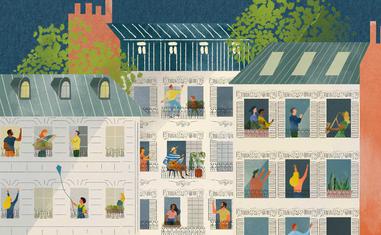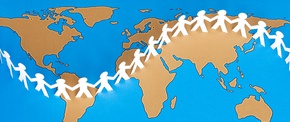The views expressed in our content reflect individual perspectives and do not represent the authoritative views of the Baha'i Faith.
We look for our families to be a source for food, shelter, and basic needs growing up and teach us love, identity, and how to move in spaces outside of the family.
While my studies in social work often focused on the role the family plays in shaping a person’s experience, I also began to wonder about the many roles we expect a larger community to fulfill for us. While we can’t always choose our community, we can choose how to engage with it. But what are the values that make for a good community?
Before I could even begin to approach this question, I realized that I would have to recognize that there are many different forms of community.
We are all part of geographic communities where we live or spend most of our time, but there are also communities where we find education — like schools or universities — or where we engage in the arts. As the internet’s role grows, and due to the COVID-19 pandemic, our digital communities are increasingly important.
The Universal House of Justice, the democratically elected governing body for the global Baha’i community, explains that a community is an entity that is more than a sum of its parts. They wrote that communities assume “a wholly new personality as an entity in which its members blend without losing their individual uniqueness.”
Like family, community plays a role in shaping the internal state of mind of its individuals. A community can impose values around money, physical appearance, and even what work a person should choose. Communities are often charged with taking care of the people who comprise them, but sometimes these charges are irresponsible and unfair: for example, when Black folks are tasked with fixing gun violence in African American communities when the issue is actually rooted in systemic racism. Other times, communities are largely hands-off in shaping the lives of their members.
RELATED: Organizing With My Community to Bring About Justice and Unity
One of the functions I value most in a community is accountability. Similar to how functional parents hold their children accountable for their promises, their growth, and healthy development, a community can hold us accountable for our actions. Shoghi Effendi, the Guardian of the Baha’i Faith, wrote:
In a world of interdependent peoples and nations the advantage of the part is best to be reached by the advantage of the whole, and . . . no lasting result can be achieved by any of the component parts if the general interests of the entity itself are neglected.
So, if one of the roles of a community is to engage in both collective and personal change, what do we do when we feel disconnected from the community around us? What do we do when the communities we do belong to don’t push us to grow?
While we may not be able to choose all of the communities we are a part of, we can choose to build connections with groups of people who have qualities we aspire to adopt. The Baha’i writings encourage us to pick our companions carefully and avoid those that hold us back from spiritual growth:
Treasure the companionship of the righteous and eschew all fellowship with the ungodly.
To actively avoid things that hold us back from becoming better versions of ourselves is to continually push back against unhealthy habits. The question then becomes: how can we stay open while also being wary of those who might harm our spiritual well-being?
RELATED: You Are Who Your Friends Are, So Choose Wisely
In my experience, this requires detaching from some of the features we tend to look for in others, simply because of their similarity to ourselves. We can then connect with people at a deeper level and truly see the underlying beliefs and qualities a person has. The Baha’i writings say:
Cleanse ye your eyes, so that ye behold no man as different from yourselves. See ye no strangers; rather see all men as friends, for love and unity come hard when ye fix your gaze on otherness.
To pick a community that holds you accountable is to surround yourself with people who are willing to lovingly encourage you to reassess your actions and assumptions. Communities that can support accountability require diversity, consultation, and strong ties of friendship. As long as we live, we can always benefit from the guidance of these kinds of communities.

















Comments
Sign in or create an account
Continue with Facebookor